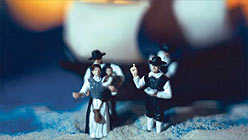Early on in The Wordy Shipmates, Sarah Vowell breaks out a telling party anecdote. “Once I decided to devote years of my life,” she writes,”to deciphering the thoughts and feelings of the dreary religious fanatics who founded New England nearly four hundred years ago, I was often asked at parties by my fellow New Yorkers the obvious question, ‘What are you working on?’ When I would tell them a book about Puritans, they would often take a swig of the beer or bourbon in their hands and reply with either a sarcastic, ‘Fun!’ or a disdainful ‘Why?’
Precisely. During the last few weeks, I often found myself snugly ensconced on the sofa with The Wordy Shipmates and a cup of tea, reading about yet another doctrinal squabble and religious misunderstanding among the inhabitants of the Massachusetts Bay Colony and find myself wondering, “Why exactly am I reading this?”
Well, for one, the Puritans are as hot of a property as they’re ever likely to be again — shaken out of the dustbin of history and revised into an actual, for real, Al Qaeda in America. And not without some reason: in England, once the Puritans got a little power, they dissolved Parliament, closed theaters, and banned makeup and Christmas. In America, as Vowell describes, they cut the ears off of religious dissenters, and set Indian villages on fire. As the British journalist Jon Ronson put it, “I know you Americans see Puritans as kindly settlers constantly sitting down to Thanksgiving dinner. We see them as bastards.” Fair enough. There are parts of this book that would not be adverse to being turned into a Tarantino movie.
Another reason: Sarah Vowell is like drug-resistant malaria. Some writers are like that. They show up again and again on your bookshelf, even if they don’t write in a particularly addiction-inducing genre, like series fiction about cats that solve mysteries. Usually, like Vowell, they have a very distinctive, friendly writing style that makes reading their book feel somewhat like going out to lunch with a very clever and witty friend who is also rectangular and easily stuffed into a handbag. Put another way, Vowell is what cigarettes are to working in the restaurant industry: not necessary, but so much more pleasant if you just give in and go have one behind the dumpster.
There’s not much history here that feels especially new — anyone who has read Lies My Teacher Told Me, or A People’s History of the United States, or 1491: New Revelations of the Americas Before Columbus is going to pretty much know what’s up with Squanto before he’s even introduced. But it’s also clear that Vowell isn’t trying to write a formal history. She’s using the Puritans and their squabbling, and America’s contemporary sterotypes about them as a way to explore what it means to be American.


